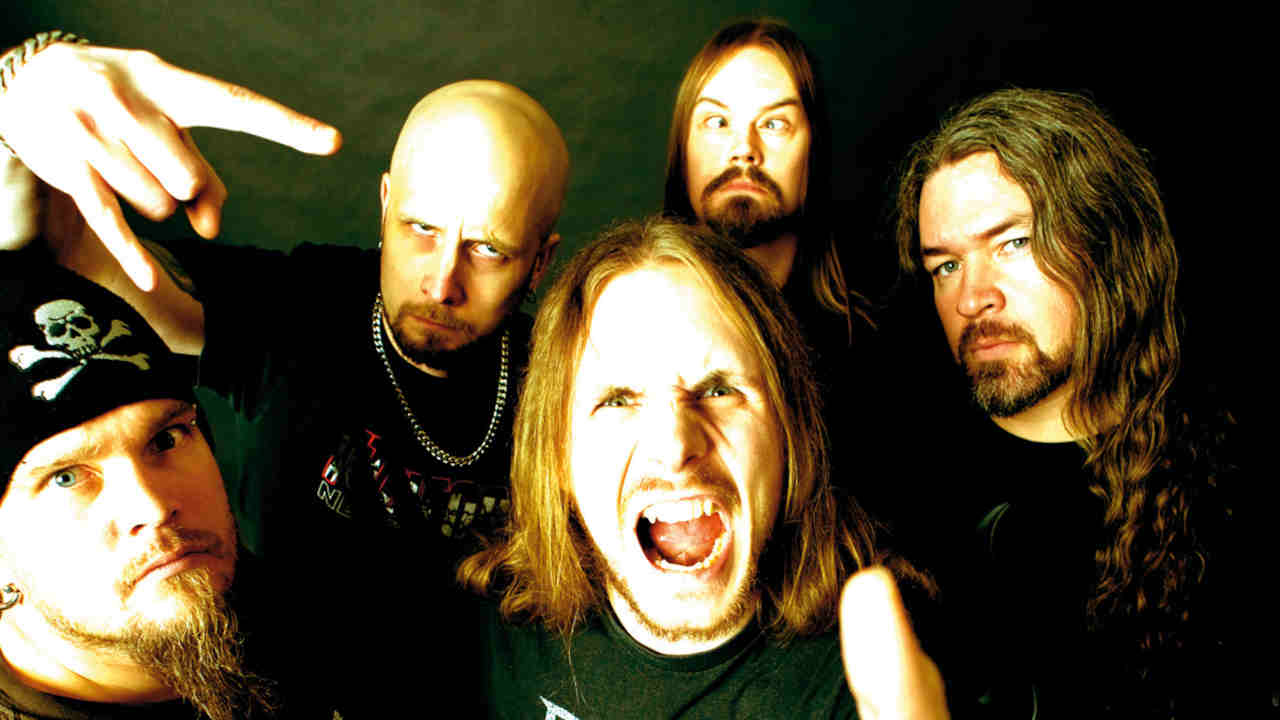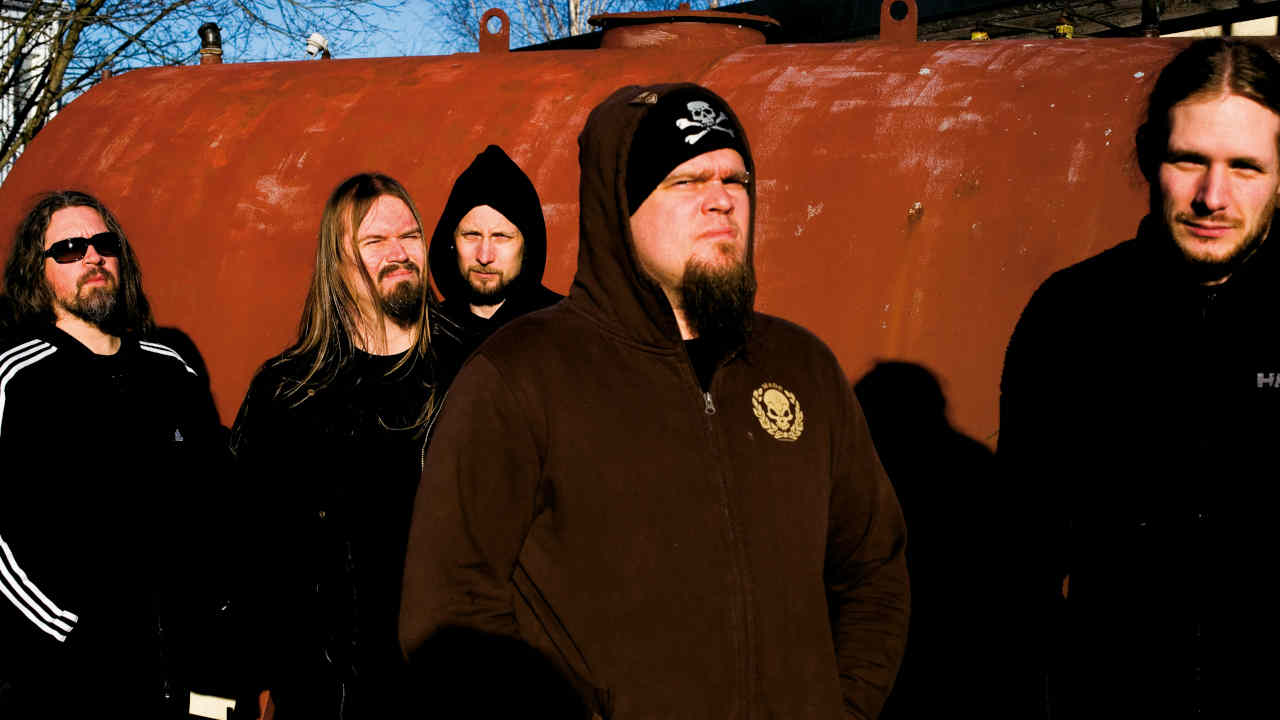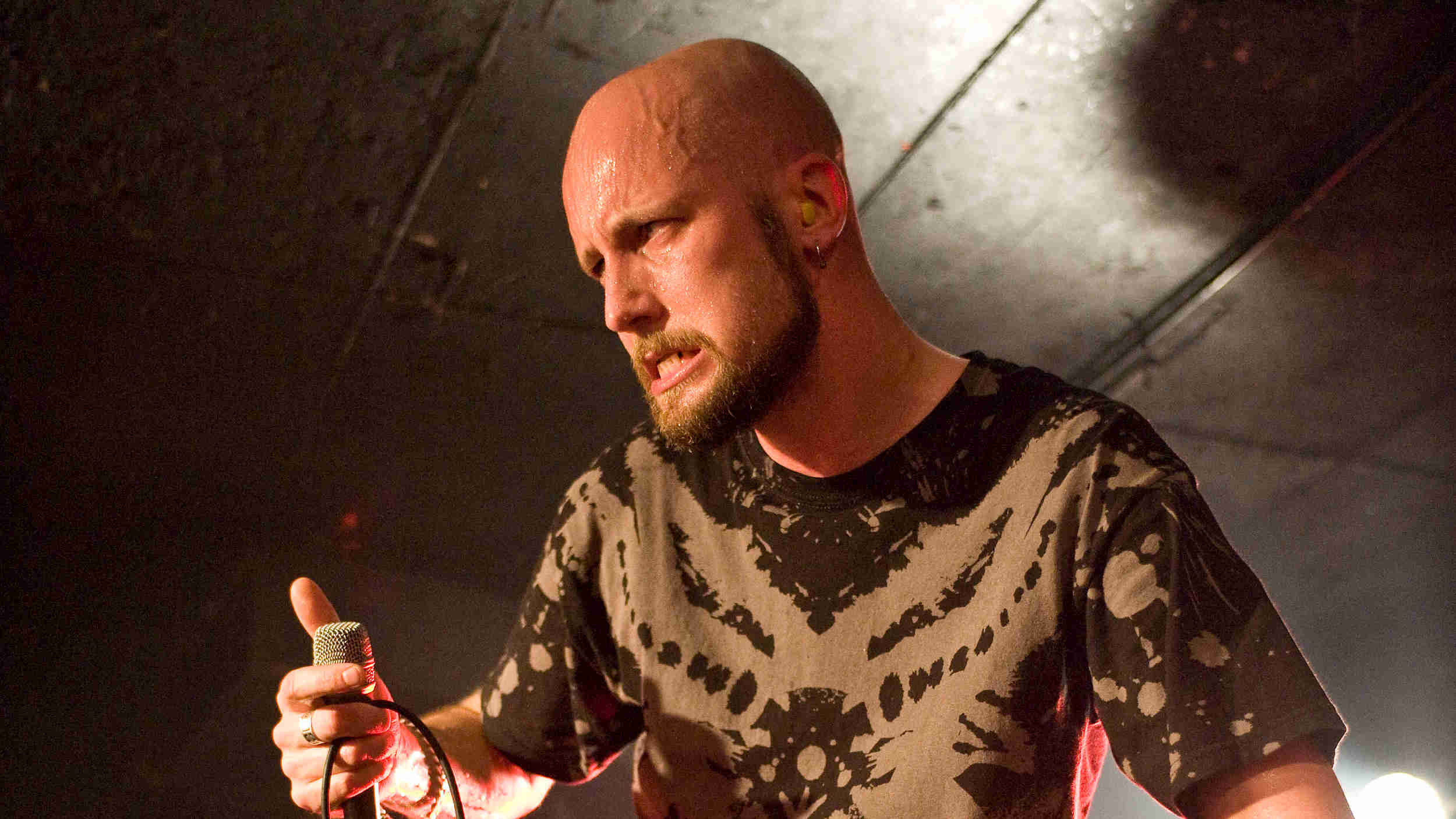
Meshuggah cornered the market in head-spinning tech metal a long time ago. By the time they released their sixth studio album, obZen, in March 2008, they were streets ahead of most other bands in terms of pushing the genre to dazzling new extremes. In this classic interview from that year, the Swedes sat down with Metal Hammer in Stockholm to reveal the secrets of their success – and their fondness for punking other bands
We want our rock stars to exude mystique, don’t we? We want them to be larger-than-life, multi-faceted, enormo-brained geniuses, oozing the glistening special stuff of sublime artistic endeavour from ear, eye and nostril, and casually squeezing out chunks of majestic sonic brilliance from their creative catflaps like so many hot turds. Certain bands make a habit of playing up to our somewhat romantic expectations, appearing to be a cut above the rest, their music unique in both conception and delivery, and their status, among those of us who are cool enough to truly appreciate what they do, wholly untouchable.
More than any other band of the modern metallic era, Meshuggah fit that lofty bill perfectly and have somehow developed a reputation as evil, guitar-wielding scientists, permanently holed-up in their secret laboratory, devising new ways to push metal into the future via the means of increasingly convoluted and rhythmically perverse riffs that the average punter needs a calculator and a whole lot of patience to decipher. Attempt to dance to one of Meshuggah’s riffs, one particular theory posits, and you may end up in hospital with dislocated limbs and soiled undergarments. This band, it seems, are pumping metal full of clever juice and daring the common man to keep up.
“That’s an interesting way of looking at it!” laughs Mårten Hagström, one half of Meshuggah’s guitar tag-team. “But actually it’s the other way around. We really don’t think too hard about what we do. The songs are whatever comes into our minds, most of the time. A lot of people seem to think we’re getting our calculators out and working out some kind of complex mathematical formula, but really we just come up with ideas and then record them. That’s it.”
Mårten shrugs and takes a big swig from his pint. Seated around a table at Stockholm’s self-consciously British-themed pub, The Bishops Arms, he and his bandmates – drummer Tomas Haake, vocalist Jens Kidman and bassist Dick Lövgren; guitarist Fredrik Thordendal is at home, having recently become a father for the first time – are venturing out into the wider world for the first time in a year or two. Famously happier within the confines of the suburban studio they share with rap-metal stalwarts Clawfinger, Meshuggah might not be the soulless mathematicians of legend, but they are plainly a great deal more reclusive than the average metal band, preferring to tour only when they have something specific and new to promote. With the long-awaited release of new album obZen imminent, 2008 looks like being a busy year for the band who are set to embark on their most intensive bout of touring since their improbable stint on the US Ozzfest tour in 2002.

“You know, we really don’t get out much!” chuckles Tomas Haake. “It’s good to be here talking to you, because usually we prefer to stay in the studio. Even when we want to socialise and have a few beers, it’s usually just with each other. It’s not like we dislike more sociable situations. We’re really not that reclusive. What it boils down to is that we’re lazy. It’s just too much hassle to sit on a train and go anywhere.”
“We don’t really worry about what’s going on in the scene,” adds Mårten. “That’s probably because we grew up in the north of Sweden, and it’s a very different thing from growing up in San Francisco or New York and being a metal band from a big city.”
Many miles away from the much-celebrated metal scenes in Stockholm and Gothenburg, Meshuggah’s hometown of Umeå has become a uniquely enigmatic and fertile breeding ground for highly original heavy music over the last few years, spawning the likes of Cult Of Luna, Burst and Khoma. Of course, Meshuggah put the town on the musical map way back in 1995 when, eight years after their formation, their second full-length album, Destroy Erase Improve, tore metal a much-needed new chuff and redefined what it meant to be forward-thinking in the world of extreme music. Like everything the band have recorded since, that breakthrough album still sounds ahead of its time and stands in stark contrast to the endless nostalgic repetition that exists elsewhere in the metal scene. It also remains incredibly hard to describe or define, leading many people to hurl the lazy epithet ‘math-metal’ at Meshuggah; a label the band themselves find highly amusing.
“A few years ago I read an article with Mudvayne and they said, ‘Yeah, we’re pure math metal!’” grins Tomas, shaking his head in disbelief. “They said you have to have a maths degree to be able to play the songs. In our world, that’s such a weird and silly way of looking at music. You know, why do you write music? Because you like math? You couldn’t find any way of expressing yourself other than through math and you had to turn to your guitar and say [adopts deadpan voice] ‘Hey buddy, we’re gonna go off on a math journey for a few years!’? It just seems so weird.”
“Being in this band, you can’t really give a fuck about any of that,” says Mårten. “I guess it’s a good thing that people like us for any reason, but if the technical side becomes the main thing you like about the band, it’s kinda strange. For me, what we do is all about the groove, but we don’t worry about why people like us, or what they expect. We just concern ourselves with what we’re doing. That’s all.”
“We don’t really care why the fans like us,” states Tomas. “Or if they think we sound like something else or if they like us because of the technical aspect or the groove or the distortion or whatever. We’re just glad people like us at all! Ha ha ha! If someone likes us because they think we sound like Watchtower or Dream Theater, that’s fine. We couldn’t care less.”
“Some guy came up to me once and said ‘I love you guys! You sound like a fucked-up CD!’,” laughs Mårten. “At least he was getting something out of it!”
Despite their magnanimous attitude towards their fans’ expectations, Meshuggah are well aware that expectations around everything that they do are ridiculously high. Just take a quick glance at the internet right now, and you’ll see frequent heated discussions about obZen and the fact that the band’s new songs are easily the most straightforward things Meshuggah have released in years, particularly in light of their self-released 20-minute, one-track I EP and 2005’s 45-minute conceptual piece Catch Thirty-Three.
“After we recorded those slabs of music, and once we got that out of our systems, it felt like the first time in a long time that we could come up with regular song structures again,” says Mårten. “I think a lot of people that were looking for the whole complexity thing might not like this album as much, but there’s more to this than you’ll hear on the first listen.
You know, we can’t please everyone. Our fans tend to be very quick with their judgement and they usually end up changing their minds. We can only please ourselves.”
“That’s right,” nods Tomas, a mischievous glint in his eye. “We please only ourselves. We’re auto-sexual. We never please anyone else. If you need a GPS to find a woman, you’re OK with us!”
Tomas is joking, of course, or at least we assume he is, but there is a sense that Meshuggah’s awkwardness, their refusal to take the traditional route in their music or their career, has been the source of some frustration among the band’s fans. A case in point was the co-headlining UK tour with Dillinger Escape Plan that the Swedes announced and then subsequently cancelled in 2007. Having failed to play a single show in the UK – or anywhere much else, for that matter – in several years, it doesn’t seem unreasonable to request a proper explanation for this latest no-show.
“Here’s the official version,” smiles Tomas. “We just didn’t have the album ready. We initially thought we’d have it done in July and release it in November, so we could tour to support the release. July went by, August went by and we knew it wasn’t going to happen because we knew we needed more time in the studio to make it as good as possible.”
OK, so what’s the unofficial version?
“The unofficial reason is that Ben [Weinman] of Dillinger was in love with Mårten,” he deadpans. “And then I fell in love with Ben. Things were turning ugly. Everybody had slept with everybody else and it started becoming weird between us. We had to avoid that whole situation.”
There’s a long pause, before Tomas grins and the whole table erupts into hysterical laughter. Even the otherwise frowning and reticent Jens Kidman is cackling merrily away, as the true, gloriously juvenile reality of Meshuggah’s often overlooked sense of humour is finally exposed. Observant fans will already know that this is a band more than capable of ripping the piss out of themselves. Head to YouTube and check out the low-budget but high-hilarity videos for New Millennium Cyanide Christ and Rational Gaze if you remain unconvinced. As more beers are consumed and the atmosphere switches from semi-serious interview mode to fuck-it-let’s-talk-bollocks mode, the reputation-shattering anecdotes start to flow, culminating in this cast-iron classic dating back to Meshuggah’s first major US tour in 1995.

“We were opening up for Machine Head on the Burn My Eyes tour,” recalls Mårten. “They actually asked for us to be on the tour with them, which was really cool. It was a great tour, but we couldn’t lay off from fucking around with them, doing stuff to fuck with their heads and pretending that we were gay. In the States there’s a lot of that homophobic macho shit going on. Machine Head weren’t like that, they were kinda mellow, but this was a 10-week tour and we could tell that they were worried. For weeks they were like, ‘What’s up with those dudes?’”
“Especially when they saw me doing Fredrik up against the bus,” says Tomas. “It was after the second show that we did, just to fuck with their heads. We were between the tour buses, and we both dropped our pants and boxer shorts, but we had big jackets on so you couldn’t see if our asses were bare or not. So Fredrik’s grunting and screaming and then the guys come out and see us between the buses, fucking away.”
“We finished the tour at the Brixton Academy in London,” adds Mårten. “Afterwards there was a big goodbye party, and Robb Flynn came up to me and said, ‘It’s been great touring with you guys, but I’ve got to tell you, it was only a few days ago that I worked out that you guys were fucking with us!’ Poor guy had been totally confused for weeks. Ha ha ha!”
They might not be deliberately messing with us on a musical level, but there’s something about the way Meshuggah take care of business that suggests that subversion comes naturally to these friendly, laidback Scandinavians. Almost uniquely in metal, we never know what this band is going to do next, and that’s something to be cherished and admired. Expect the unexpected. Whatever happens, the one thing Meshuggah will never be is boring.
“You never know, man,” muses Tomas. “Sometimes when we rehearse we do start playing some weird, straightforward, super-cheesy stuff. It gets so totally Christian immediately! Ha ha ha! The problem is, we kinda want to do that more than we want to rehearse our own music, because our own music is sports music! You get blisters and it hurts. Damn it, I want to play something easy!”
Originally published in Metal Hammer issue 177







